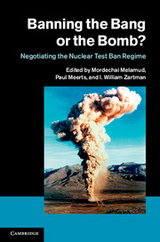The case of Arcania: perspectives in point-of-entry negotiations
Penetrante, Ariel Macaspac
Externe Publikationen
(2014)
in: Mordechai Melamud / Paul Meerts / I. William Zartman (eds.), Banning the bang or the bomb? Negotiating the nuclear test ban regime, Cambridge, UK: Cambridge Univ. Pr., 277-296
ISBN: 978-1-10735-834-8
DOI: https://doi.org/10.1017/CBO9781107358348
Information
The Comprehensive Nuclear Test Ban Treaty Organization (CTBTO) conducted its first large-scale on-site inspection (OSI) exercise from September 1 to 25, 2008. This exercise, the Integrated Field Exercise (IFE) 2009, was conducted in Kazakhstan to simulate a complete on-site inspection that intends to test most elements of the OSI regime such as inspection technologies and methods. The CTBTO, once it comes into force, will maintain a global alarm system by developing tools to verify compliance. The OSI is the final tool of the verification regime. It complements the International Monitoring System (IMS) with its 337 facilities scattered all over the world. The purpose of the on-site inspection is to clarify whether a nuclear explosion has been carried out in violation of the Treaty. The 40 members of the inspection team (IT) are experts in the different technologies used for inspection: seismic, hydroacoustic, infrasound and radionuclide.
This chapter argues that besides the need to test the technical dimension of inspections, there is a need to examine the competence of inspectors to deal with the complexity of negotiations. The difficulties that future inspections would be exposed are not limited to technical inspection methods and procedures. Difficulties brought by the complexity of negotiation as a decision-making process will eventually confront future negotiators. Negotiation is a communication instrument to reach an agreement between parties. Assuming that OSI involves merely the use of technologies for inspections and therefore, there is no need to prepare future inspectors in negotiations is misleading. On-site inspections will always involve political elements that may impede the conducting of inspection. Future negotiations between the Inspection Team (IT) and the Inspected State Party (ISP) will inevitably involve bargaining. They involve power games that determine interactions between actors. Hence, negotiation tools should be developed for future inspectors.
Weitere IDOS-Expert*innen zu diesem Thema


